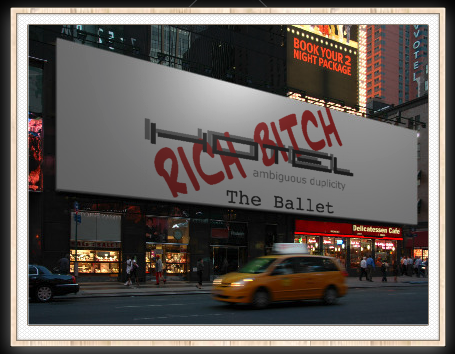“Rich Bitch - HOTEL - ambiguous duplicity” - Ballet Score
Composer: Anthony Gustav Morris
ABOUT THE TITLE: I have written about this in the FAQ and have talked to a lot of people on this subject. I am a composer, not a world expert on feminist sensibilities. I am however a reasonable and sensitive person (at least I try to be) so there is a questionnaire as to whether this title is a good or a bad thing and, if it is overwhelmingly negative, I'll change it, which may happen anyway, it has three titles because of just this!
Ref: AGM-01072013
Commission (Anon)
35 Minutes
2009
Status: Score and parts available (rental)
35 Minutes
2009
Status: Score and parts available (rental)
Ballet score for medium sized orchestra.
The brief for the piece
Before starting this project I asked for some advice from those who would know and one letter I received is quoted here:
London, 20th August 2009
Dear Anthony,
You can think about writing a ballet score? Keep it within the following specification if you can.
An ideal length would be between 30 and 40 minutes. This allows it to be used in one half of an evening so another work by say, Stravinsky can occupy the second half. It can even be a one-act opera if the theatre wants to involve both genres in a program.
Keep to one stage set for the whole piece. Think also about filming requirements for budget 3D programming. Try and find a theatre willing to cooperate with you on this as a project.
Make the storyline to involve characters who have different personalities and come from differing backgrounds socially. Allow for variety of dance skill. Characters who may not be soloists but have strong character attributes with also soloists who can portray beauty and grace. Give a group of dancers some space to do something. Finish with a Finale that is exciting!
With interludes for conveying narrative, make solo variations that are between 2 and 5 minutes as this is an ideal length for stamina and interest. At least one nice Adagio for spectacular soloists to show extreme skill.
Make a contrast between variations. Strong characters require strong music and try to bring some lyrical beauty to the other solos. Let some instrumental soloists carry the characters on stage.
As to the musical style; please make this “accessible” for immediate appeal! Don’t write anything in a musical vocabulary that can’t be instantly really appreciated by an audience that is used to TV and Film. This should be enjoyable entertainment and not “high art”. You can do that with your other compositions.
Use an orchestra of medium size. Not Mahlerian proportions but something that a theatre can afford to take on tour but impressive enough.
Good luck, I know you can do this!
Best regards,
Before starting this project I asked for some advice from those who would know and one letter I received is quoted here:
London, 20th August 2009
Dear Anthony,
You can think about writing a ballet score? Keep it within the following specification if you can.
An ideal length would be between 30 and 40 minutes. This allows it to be used in one half of an evening so another work by say, Stravinsky can occupy the second half. It can even be a one-act opera if the theatre wants to involve both genres in a program.
Keep to one stage set for the whole piece. Think also about filming requirements for budget 3D programming. Try and find a theatre willing to cooperate with you on this as a project.
Make the storyline to involve characters who have different personalities and come from differing backgrounds socially. Allow for variety of dance skill. Characters who may not be soloists but have strong character attributes with also soloists who can portray beauty and grace. Give a group of dancers some space to do something. Finish with a Finale that is exciting!
With interludes for conveying narrative, make solo variations that are between 2 and 5 minutes as this is an ideal length for stamina and interest. At least one nice Adagio for spectacular soloists to show extreme skill.
Make a contrast between variations. Strong characters require strong music and try to bring some lyrical beauty to the other solos. Let some instrumental soloists carry the characters on stage.
As to the musical style; please make this “accessible” for immediate appeal! Don’t write anything in a musical vocabulary that can’t be instantly really appreciated by an audience that is used to TV and Film. This should be enjoyable entertainment and not “high art”. You can do that with your other compositions.
Use an orchestra of medium size. Not Mahlerian proportions but something that a theatre can afford to take on tour but impressive enough.
Good luck, I know you can do this!
Best regards,



